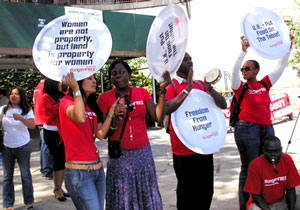
UNITED NATIONS (FinalCall.com) – The 62nd UN General Assembly opened on Sept. 18, and activists from ActionAid, an international anti-poverty agency, stood across the street in Ralph Bunche Park to shout to the world body that 25,000 people were dying everyday from hunger. They called on representatives of the UN’s 192 nations to make hunger and the right to food a political priority at their General Assembly meetings.
“For every day that the General Assembly fails to take action, another 16,000 children die,” Thomas Johnny, policy research manager for ActionAid Sierra Leone told The Final Call. “That a room full of the world’s most powerful people should fail in their goals so completely is inexplicable,” he added.
Mr. Johnny was talking about the promise that world leaders made in 2000, known as the Millennium Development Goal to halve hunger by 2015.
“In 2000 there were 800 million people in the world who were hungry. Today, there are 854 million people hungry,” argues Ibrahima Niasse, head of Senegal’s Farmers’ Platform. “If the people are hungry, they cannot work, they cannot study, they can do nothing,” Mr. Niasse explained to The Final Call.
“These guys made that promise seven-and-a-half years ago, and hunger is actually on the increase, so, I think we need to remind everybody of their promises; and that they have to do more,” Mr. Johnny said.
He said Sierra Leone was almost second to last on the world’s development index, and has some of the worst statistics in terms of female and child mortality. “Records show that at least 70 percent of the population is poor; and that one-in-five go to bed hungry,” Mr. Johnny said.
Mr. Johnny explained that some of the factors causing hunger in his nation was the “lack of access to fertilizer, the rising debts of small farmers and soil degradation.”
In July, the UN Food and Agriculture Organization (FAO) reported that a predicted decline in the rate of cereal production in many low-income food-deficit nations could lead to a tighter food supply situation as 28 nations would suffer “serious” food shortages. Sierra Leone is one of the 28 nations. According to ActionAid, three-quarters of the 60 percent of Sierra Leone’s rural population are “poor and hungry.”
Other nations mentioned in the UN report were Eritrea, Ethiopia, Mauritania, Burundi, Central African Republic, Democratic Republic of Congo, Kenya, Democratic People’s Republic of Korea, Pakistan, Sri Lanka and Bolivia, to name a few.
“Rising costs are taking a bite out of the ability of the United Nations to help feed the world’s starving,” stated a story in Canada’s Ottawa Citizen in July. The writer, Steven Edwards, said UN senior officials pointed to a number of factors, including the “trend to dedicate increasing amounts of farmland to crops for the production of bio-fuels rather than food.”
According to the news story, skyrocketing demand for food from China and India is also creating scarcity; and the falling value of the U.S. dollar in relation to other currencies is “stretching the UN’s emergency food aid budget.”
“All this has led to a tight operating environment for us, Greg Barrow, spokesman for the World Food Program said.
The UN agency spent $600 million on food in 2006, but fed approximately 90 million of the estimated 850 million people worldwide who are considered to be seriously undernourished.
But, the activists say that there must be an end to the UN’s excuses. “Now is the time for the UN to show it really means business and has what it takes to end hunger. The beginning of the 62nd Session should mean an end to broken promises,” said Shahidur Raman, head of the Livelihood Security and Risk Reduction Sector, ActionAid Bangladesh.
“The General Assembly itself set the Millennium Development Goals. Delegates signed them with their shiny pens, gave impassioned press conferences, then failed the world miserably,” Mr. Raman stressed.
Mr. Raman said that Bangladesh is a low-income food deficit nation. “Approximately half of our people live below the poverty line and have to spend at least 70 percent of their household money on food.”
“We want the General Assembly to push governments to recognize that women have a right to access land because half of our women are malnourished; and nearly half of all children under five are under weight,” he stressed.
Mr. Niasse said that the same is true in Senegal. “Women are mainly responsible for feeding their families and provide 52 percent of agriculture labor, but they only have access to less that two percent of the land.”












